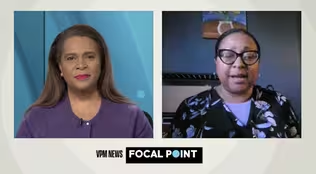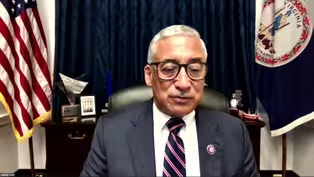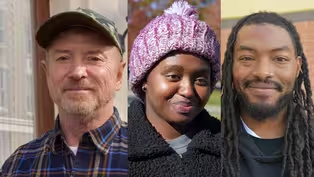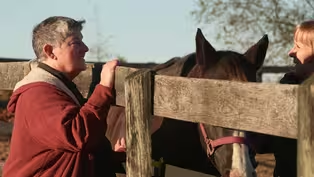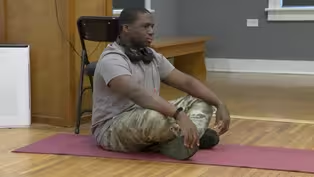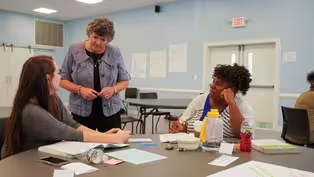VPM News Focal Point
Mental Health | December 01, 2022
Season 1 Episode 18 | 26m 46sVideo has Closed Captions
Teen Anxiety and Isolation; Suicide in Virginia; and youth mental health first aid
Teen Anxiety and Isolation: How young people are managing their mental health; Suicide in Virginia: speaking openly about self-harm; Virginia Home for Boys and Girls teaches youth mental health first aid and tools for success.
Problems playing video? | Closed Captioning Feedback
Problems playing video? | Closed Captioning Feedback
VPM News Focal Point is a local public television program presented by VPM
VPM News Focal Point
Mental Health | December 01, 2022
Season 1 Episode 18 | 26m 46sVideo has Closed Captions
Teen Anxiety and Isolation: How young people are managing their mental health; Suicide in Virginia: speaking openly about self-harm; Virginia Home for Boys and Girls teaches youth mental health first aid and tools for success.
Problems playing video? | Closed Captioning Feedback
How to Watch VPM News Focal Point
VPM News Focal Point is available to stream on pbs.org and the free PBS App, available on iPhone, Apple TV, Android TV, Android smartphones, Amazon Fire TV, Amazon Fire Tablet, Roku, Samsung Smart TV, and Vizio.
Providing Support for PBS.org
Learn Moreabout PBS online sponsorshipANGIE MILES: In this episode of "VPM News Focal Point," the state of our state when it comes to mental health, with two mass shootings within the past month and alarming rates of suicide, we examine what's going wrong and where our opportunities lie.
We'll talk about young people and stress, show you people who are living beyond suicide, and connect you with a potentially life-saving resource that's absolutely free.
You're watching "VPM News Focal Point."
Production funding for VPM News Focal Point is provided by Dominion Energy, dedicated to reliably delivering clean and renewable energy throughout Virginia.
Dominion Energy, Actions Speak Louder.
The estate of Mrs. Ann Lee Saunders Brown.
And by... ♪ ♪ ANGIE MILES: Welcome to "VPM News Focal Point."
I'm Angie Miles.
Many of us have heard the saying, "Health is wealth," but do we know the true value of our physical and mental wellness?
We'll talk about that in this episode.
We need to advise you that we will be covering mature themes and difficult topics that may be upsetting to some viewers.
We begin with the big picture.
Americans are becoming more anxious and more depressed.
Recent studies show major increases in mental health issues related to events including COVID, political divisions, and social unrest.
political divisions, and social unrest.
A new legislative commission report from JLARC shows young Virginians are suffering too.
It found nearly 2/3 of high school students are nervous, anxious, or on edge, and 13% of them have seriously considered suicide.
Mary Beth Walsh of the National Alliance for Mental Health in Virginia says feelings of isolation due to decreased face-to-face interactions and increased social media usage contribute to these anxieties.
MARY BETH WALSH: Kind of putting on a front, if you will, on social media, and making it look like you have a perfect life can play into the mental health of those that are seeing these lives unfold on social media and thinking, "Why can't I have that, or why my life isn't like that?"
ANGIE MILES: Walsh recommends limiting time on your phone, increasing in-person interactions, and getting involved in outdoor activities.
After two deadly mass shootings in Virginia within a month, Governor Glenn Youngkin says he will propose additional mental health resources for Virginians in the next general assembly session.
During a vigil in Chesapeake, the governor said The state is facing a mental health crisis.
GLENN YOUNGKIN: We must not evolve into a sense of national despair, personal despondence.
Rather, we must mend our wounds of grief with an unyielding determination to change the conditions of our society that have increasingly bred a culture of despair.
ANGIE MILES: The governor is pledging to work across party lines to improve mental health care in the state.
ANGIE MILES: In our travels throughout the Commonwealth we asked Virginians this question: is mental health more, less or equally important as physical health?
This is what they told us.
JULIEN ELEY: I do believe it is more important 'cause, I mean you can go outside and exercise, you can get your body right, but with mental health sometimes some people just don't know or some people might need extra resources to get that kind of help.
CHIQUITA JETER: Everything starts from the mind and that's how we can achieve our goals or go work out.
I really think it's important to keep our mind grounded.
DHIMAN GOSWAMI: Mental health and physical health is equally important because if you are not happy in your mind your physical health will also deteriorate.
And we have many doctors to take care of our specific physical health issues, but in comparison to that, like people actually, the mental health issues are not properly addressed in our society.
DAN GUNNELLS: If you are healthy mentally then you're more apt to be healthy physically and, but those are huge challenges.
I mean, again, the resources are not there, and we don't take it seriously politically.
The country officials don't take it seriously.
RUEBEN SHANKS: It usually starts with the mind before the body.
So I think mental should be number one before the physical.
ANGIE MILES: Respondents shared universal frustration about the lack of resources to help people deal with mental health issues.
A CDC survey found that anxiety and depression in teens increased during the pandemic and more than one in three high school students experience persistent feelings of sadness or hopelessness.
Virginia educators are at the front line of this crisis.
Adrienne McGibbon introduces us to two educators who say connection is key to addressing anxiety.
JOSEPH ALLEN: Humans are pack animals, and we don't always recognize it, but we really depend on one another, that without other people, we wouldn't survive for very long.
And what adolescents are in the midst of doing is learning just how to manage those relationships.
ADRIENNE MCGIBBON: Dr. Joseph Allen is a psychology professor at the University of Virginia.
He says increased isolation has led to higher levels of depression and anxiety among young people.
JOSEPH ALLEN: The way I think about COVID is it deprived adolescents of relationship experiences at a key point, and you can think of it this way.
If you had a three-year-old going through their growth spurt and they didn't get any protein in their diet for a year, that would be terrible.
Adolescents didn't get any social relationship experience in their diets for a year or a year and a half during a critical period.
And that is not going to be something that's going to be easy to recover from.
ADRIENNE MCGIBBON: Dr. Allen started a program at UVA in 2018 called “Hoos Connected ” to teach students how to build relationships.
Several students who've been through the program now facilitate the course.
TYLAR SCHMITT: And we have this whole conversation of sometimes we put on these masks to fit in with others and to fit in with other people, but how can we sort of break down those masks and know each other for our authentic selves?
CAROLIN FABIAN: Like showing your vulnerable sides because I think everybody has those and everybody has things they're struggling with, and if we're not willing to show those to other people, then we're not going to be able to heal together.
JOSEPH ALLEN: You get them to let down their guard and recognize whoa, everybody else has the same concerns and fears that I do, and you go from intimidation and jockeying for position to support.
ADRIENNE MCGIBBON: Dr. Allen says the program has grown from just a few dozen participants in 2018 to about 1,000 this year.
Students say it's helped them feel more connected.
Another Virginia educator is using meditation to help students address their anxiety.
WELFORD MCLELLAN JR: And I want you to take a deep inhale through your nose, and exhale through your nose.
When you're trying to talk to someone who is going through stressful times, their minds don't know where to begin.
Taking the time to calm your mind will allow them to then think and then share what the root causes are.
ADRIENNE MCGIBBON: Welford McLellan Jr. is the Dean of students at Renaissance School, a private high school in Charlottesville.
He teaches meditation as a tool for students.
WELFORD MCLELLAN JR: Do some wrist circles.
OLLIE MUNZENRIDER: So I've always been fairly good at managing things, but I will say that I believe that the meditation has really helped me with my mental health.
WELFORD MCLELLAN JR: Neck circles.
ADRIENNE MCGIBBON: Studies show that meditation has benefits, such as reduced stress, improved well-being, and higher self-esteem.
WELFORD MCLELLAN JR: You may gently blink open your eyes.
ADRIENNE MCGIBBON: McLellan says it helps students address larger issues they may be having.
WELFORD MCLELLAN JR: As we calm our minds, we get a better sense of what is going on in our minds and how we can share that information.
AKINWUNMI AKANMU: Before I started doing meditation, I've always been a mental state of chaos.
I think a lot, and sometimes that impacts how I'm feeling or the way I treat people around me.
And now that I'm doing meditation, I've noticed an increase, an improvement in my own personal mood, and I definitely treat people better.
ADRIENNE MCGIBBON: Dean McLellan says, meditating does more than calming the mind and reducing individual stress.
It can help students think of others' needs and ultimately, build stronger communities.
WELFORD MCLELLAN JR: As we go through these practices of breathing and thinking and sharing, it allows us to join as a community.
It allows us to gain understanding for one another.
It allows us to really empathize with one another so that each and every day, instead of everything being about us or everything being about me, it is about the community.
(students breathing deeply) ANGIE MILES: Dean McClellan says his students have become more aware of how their behavior impacts their community.
And Professor Allen says several other universities across the country are now considering implementing programs similar to “Hoos Connected.
” VPM News Focal Point is interested in the points of view of Virginians.
To hear more from your Virginia neighbors, and to share your own thoughts and story ideas, find us online at vpm.org/focalpoint.
ANGIE MILES: We advise you that we are now turning to a very sensitive subject.
For almost 20 years, the suicide rate in the United States had been increasing up more than 30% from 2000 through 2018.
Then interestingly, the rate dropped for two years.
But in 2021, it began rising again.
When it comes to gun deaths in America, suicides consistently outnumber murders.
For many people, suicide has been a topic that's too painful to discuss, but that is starting to change.
Artists are singing about it, organizations are offering helplines and training for intervention.
The American Legion has just announced its Be the One campaign.
Even individuals who have attempted suicide are asking others to talk about it to save lives.
(motorbike rumbling) ANGIE MILES: American Legion Riders come together to honor the fallen, strengthen their bonds.
>>Thank you for your service.
ANGIE MILES: Support one another and raise awareness about veterans issues, including suicide.
JOHN POTTER: Because people don't understand that when you come back from any engagement anywhere, it's not over.
It's still in your head, it's still in your body.
So it goes on and on.
I've lost several friends over the years due to PTSD, and it is very near and dear to my heart.
FREDDY MARKS: It hurts.
It hurts because they didn't ask for help.
And that's all you have to do.
Like the homeless, a lot of homeless veterans out there, they don't know who to call or where to reach out.
And because they, you know, look like they've been on the streets, nobody's willing to help them.
ANGIE MILES: Statistics tell us that veterans are at great risk and so are active duty service members.
Cliff Bauman decided in 2002, that he could no longer live with what felt like failure.
The September 11th attack on the U.S. Pentagon had left the 33-year-old National Guardsman with nightmarish memories of a two day search through the wreckage and the sorrow of finding no one alive.
CLIFFORD BAUMAN: It was late at night.
I was at my brother's house, and I had been drinking.
I was feeling guilty and upset over all the thoughts of 9/11 and I just didn't want to deal with it no more.
And so I took 22 sleeping pills.
I wrote a note and laid down on my brother's couch.
ANGIE MILES: Post traumatic stress, a sense of hopelessness, the pain of bullying or abuse, these are some of the reasons suicide is a leading cause of death across all ages in America.
Sylvia DeVoss was in her 30s when she decided to end her life.
SYLVIA DEVOSS: I went up into the mountains on the Blue Ridge Parkway and pulled over and pulled out my .38.
And I just remember thinking that this is the perfect place to end my life.
Because at that point, I just felt that I was a menace to everyone.
And I remember saying, "Dear God, please help me."
And my intent with that was for him to help me have the guts to pull the trigger 'cause I had it right here at my temple.
ANGIE MILES: She recalls a childhood marked by fear and pain including abuse by a male relative.
SYLVIA DEVOSS: He used to come in my bedroom and do things sexually with me that was just horrible.
And I'm pretty sure my dad was aware of it.
I couldn't swear to that.
My mom never seemed to be around, which I find interesting.
I'm not sure she could have done anything because my dad was extremely forceful, and, you know, I never saw him abuse her except for verbally.
And he would lash so hard that I would be scared for my mom.
I did talk about the abuse, and I remember people would not believe me.
And it was pretty obvious that it really didn't matter what I said, you know?
I had been branded a liar by my dad very effectively.
And I'd run and hide in the woods for days and days and days.
And I remember in fifth grade, there was a writing assignment, and I'm not quite sure what I had said in my paper that triggered somebody, but my teacher just got up and grabbed me by the wrist and took me to the principal, and they called my dad.
And it was the school psychologist involved.
And all I remember is when we got home, my dad really just annihilated me.
And so I just learned not to say anything.
ANGIE MILES: Sylvia describes feeling ostracized and misunderstood growing up as a Jehovah's Witness and being excluded by both black and white people she thought were her friends.
All that early hurt, she says, made suicide feel like the best solution.
SYLVIA DEVOSS: And when I pulled the trigger, it pulled the nozzle right in front of me.
And so it went off in front of me instead of in me.
And I hit the ground.
And I just remember when I realized that I was not hit, I was so angry, and I was angry at God because he helped me in the wrong way, you know?
And it was like, what do I do at this point?
ANGIE MILES: What she did was throw away the gun, come down from the mountain and call for help.
SYLVIA DEVOSS: And I'm so beyond grateful that I missed.
And if people could just get through that moment, it's literally just a moment in time, that if you could just get that temporary shake up in your head that this is really not worth it, you know, your life can become whatever you want it to.
ANGIE MILES: Her life today is about art and service.
She's an avid photographic artist, a creator of workshops on healing and spiritual growth, a mother, a grandmother, a person who lives to help others.
SYLVIA DEVOSS: I totally forgive.
In fact, I'm actually grateful for my past.
And I say that, I wouldn't recommend it to anyone, but I say that because I don't know who I would be if it weren't for all the weird stuff that happened to me as a kid, all the abuse, all the people that didn't, they didn't count me in for anything.
You know, I have very good friends that you would never know also suffered a lot of abuse because if you knew who they were, you'd go, "No way."
And that's the kind of person I want to be.
That people see me for who I am now, and that I can help with, you know, things you're going through, but I'm not there anymore.
I'm just not, thankfully.
ANGIE MILES: The same is true for Cliff Bauman.
After he overdosed, his brother found him unconscious and got him to a hospital.
Then Bauman says he got honest and got help.
His life's work now is helping others to fully live.
CLIFFORD BAUMAN: I have to believe that I survived my suicide attempt for a reason.
And this is why I do what I do.
This is why I started the Mental Health Warrior podcast.
This is why I do my speaking events, and this why I do my book.
But I understand what it's like not to want to see the dark.
I understand what it's like not to want to see the daylight.
I understand what it's like not to want to open your eyes in the morning.
But I also understand the opposite of it and how great life can be.
I wouldn't have my two boys.
I wouldn't have my wife who now we've been together for 15 years.
I wouldn't have any of that.
Once you learn to control that, if you have PTSD or mental health issues, and learn with good tools on how to get past it, life is so much better and so great.
ANGIE MILES: Seven years after his suicide attempt, Cliff Bauman saved the lives of three people who were drowning in the Chesapeake Bay.
With his "Mental Health Warrior" podcast and his work as a post-traumatic stress disorder educator, it's possible he's saving even more lives today.
The mission to save lives also influences national legislation.
We spoke with Congressman Bobby Scott who represents the third district where the Walmart mass shooting occurred about what needs to happen to stop these deadly shootings.
Watch this excerpt.
ANGIE MILES: It's unfortunate that we even have to consider these kinds of things at all or to consider the influence that people's adverse mental health conditions have on public safety.
But we have to consider it.
Last night you led the House in the passage of the Justice and Mental Health Collaboration Reauthorization.
Tell us a little bit about what that is and what you hope it will accomplish.
BOBBY SCOTT: That deals with a lot of mental health problems within the criminal justice system.
A significant number of people in jails, about half the people who are admitted to jails have mental health, have a history of mental health problems.
About a third of the people in prisons have a history of mental health problems.
Those mental health problems should not be dealt with in jails and prisons, they ought to be dealt with in mental health facilities.
And this gives funding to help in that area.
ANGIE MILES: So it was a bipartisan effort put forth in the House, and you're hopeful that the Senate will pass it too.
You said that this is a complex issue, you can't say that enough.
We haven't solved it yet.
BOBBY SCOTT: I think it's important to note that we had 600 mass shootings already this year.
In most countries, mass shootings are virtually unknown.
You'd had, well, we had one two years ago.
Let me see, we had 600 this year.
There's nothing in the United States mental health status that can explain 600 mass shootings.
This is not a mental health crisis.
This is a gun crisis.
You can watch the full interview on our website ANGIE MILES: Mental health issues are a growing concern for young people.
A CDC report found more than one in six youths said in 2019 that they had made a suicide plan within the past year.
The content of the following story may be upsetting to some but there's good news.
There is evidence-based training that helps adults identify signs of distress in youth and respond proactively.
One such program is the Youth Mental Health First Aid course offered by the Virginia Home for Boys and Girls, and it's free.
KAREN RICE: How do you know when you're being listened to and how do you know when somebody's checked out?
Listening sounds easy, but it's not.
You know when someone's listening to you, you know when they're not.
Youth are very attuned to whether or not we adults are taking them seriously.
And when they understand that we're taking them seriously, we're going to get a lot of information and we're going to be able to connect and be helpful.
CLAIBORNE WARNER: Understanding that even someone like me, I'm not a therapist, I'm not trained in mental health per se, but I could do something to intervene, I could do something to act, I could do something that would make a difference in that person's life.
MAGGIE RZASA: Any individual can have a mental health crisis at any given time.
So the more people that are educated, the more resources we have, the more we know how to respond to those situations, I think the more we can help people around us and continue to talk about mental health.
WILMA SPRINGS-MCKEITHAN: It shows you how to approach the kids.
It shows you how to interact with them, to get them to talk to you about what's going on in their life.
And I cannot wait to carry it back to my church.
KAREN RICE: So remember, being direct and non-judgmental.
REGINA WASHINGTON: I've seen an increase of students facing anxiety and just not feeling good about themselves.
So it's just giving me some strategies to reach out to them.
KAREN RICE: Youth are exposed to things through social media that my generation and certainly the generation ahead of me really never had exposure to.
We've taught them to look for answers, look for entertainment in social media, in a phone, not in interacting with other people, not in verbally communicating their needs and feelings and wants.
CAPRICIEA ANDERSON: Letting people know there are more resources out there than they may imagine that are available to them that may not even be cost a thing.
ERIN MATHEWS: She makes us feel like we're already educated and she really did plug in like those gaps of things that we thought we already knew, but she was able to plug in those gaps, which was really cool.
SANDRA JEFFERSON: I've had training before, but this training was different because it was practical and it's something that I see or that I wish could be in schools or in churches because it's so practical that other people can do it.
You don't have to be a professional.
JONI MARSHALL: I lost my son in 2014 to suicide and had no inkling that there were problems.
So I am so thankful for this today that I could see the signs that I may have missed, that his friends may have missed, and how to be able to deal with it and take a step back in a holistic view of it.
DANIELLE FULLWOOD: If I had these tools early, I think I would've helped a friend of mine.
But not being informed and not being trauma informed, I didn't catch the clues at the time, but now I am equipped to help somebody else.
ANGELA AURELIA COOK: When people are in that place of risk for suicide or contemplating or you know could be in that place already in an action plan, it's how to be direct, how to be calm, how to take the actions, how to approach them, how to get them the help they need, how to be with them during that time.
KAREN RICE: We want to fix it, we want to make it better.
So we start offering advice and if you just do this, it'll be better.
Or here's what I did for me and it got better.
And all of those are conversation enders, not only for youth and teens, but for anyone.
We don't want to be compared.
We want someone to hear what's important and authentic to us at this moment.
You don't have to be a therapist to be therapeutic.
You can use these skills with your family, with your neighbors, with strangers.
We wouldn't deny anyone physical first aid, and no one needs to be denied youth mental health first aid either.
ANGIE MILES: How do you define your own mental health?
What does wellness look like for you?
Hopefully today's show has included tools to help answer those questions.
And you can find more resources on our website including our full in focus interview, vpm.org/focal point.
Thank you for being here.
We'll see you next time.
Production funding for VPM News Focal Point is provided by Dominion Energy, dedicated to reliably delivering clean and renewable energy throughout Virginia.
Dominion Energy, Actions Speak Louder.
The estate of Mrs. Ann Lee Saunders Brown.
And by... ♪ ♪
Video has Closed Captions
Clip: S1 Ep18 | 6m 11s | The American Foundation for Suicide Prevention offers hope and healing to Virginians. (6m 11s)
Video has Closed Captions
Clip: S1 Ep18 | 10m 40s | Bobby Scott says common sense firearms laws can help stop an epidemic of mass shootings (10m 40s)
Mental Health | People of Virginia
Video has Closed Captions
Clip: S1 Ep18 | 1m 11s | We asked Virginians: Is mental health more, less or equally important as physical health? (1m 11s)
Video has Closed Captions
Clip: S1 Ep18 | 7m 13s | Some who survive suicide attempts talk about what drove them to the breaking point. (7m 13s)
Virginia Educators Working to Ease Anxiety
Video has Closed Captions
Clip: S1 Ep18 | 4m 16s | Levels of Teen anxiety and depression are rising, and two teachers help students cope (4m 16s)
You can learn about mental health first aid
Video has Closed Captions
Clip: S1 Ep18 | 4m 4s | The free training assists anyone to become a lifesaver (4m 4s)
Providing Support for PBS.org
Learn Moreabout PBS online sponsorship
- News and Public Affairs

Top journalists deliver compelling original analysis of the hour's headlines.

- News and Public Affairs

FRONTLINE is investigative journalism that questions, explains and changes our world.












Support for PBS provided by:
VPM News Focal Point is a local public television program presented by VPM
